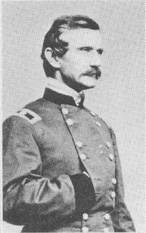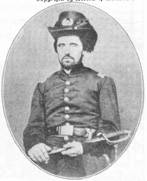POLITICS AND WAR
Much has been written about the merits of this General or that General on the battlefield, and no doubt will continue to be.
Less if any has been written about the backroom boys, the so called desk bound Generals, Political Commissions that both Presidents had to make during the War.
Commissions were given to prominent Politicians to aid recruitment of various factions, such as the Irish (Thomas F Meagher & Thomas Sweeney), the Germans (Franz Sigel, Carl Schurz & Alexander Von Schimmelfennig). The Poles (Wladimir Krzyanowski) were all made Generals, some like Sigel commanded small armies for a short time, none were considered to be competent and were weeded out later in the war.
Democratic Politicians considered loyal to the Republican war effort were also made Generals in order to aid recruitment. Men such as Daniel Sickles and Benjamin F Butler rose to Corps command before being weeded out by Grant.
The situation in the South was far better as President Davis made far fewer political appointments than did President Lincoln and considerably better choices, only a few politicians in the south rose to the rank of major General, the most notable of these are Howell Cobb of Georgia, John C Breckinridge of Kentucky, and Thomas C Hindman of Arkansas. All three acquitted themselves well.
Davis did not have to grant commissions to lure ethnic minorities, as the South was almost entirely Anglo-Saxon in origin.
On both sides many of the political appointee's were given the sort of commands that suited their particular skills as Statesmen and Businessmen. These men it is said (strapped their saddles to a desk).
The North and the South were divided into Departments, Districts and even on occasion sub-districts which needed to be administered. Some of these Departments were very large indeed like the Confederacy's Trans-Mississippi, which was actually a third of the country, but more often they were one or two states combined, and even down to those portions of state not occupied by Federal forces.
Then there was another sort of General: the staff officer. They were mostly no higher in actual rank than Colonels, Majors and even in some cases Captains, but due to brevets or patronage, some of them wore the stars of Generals, men such as E P Alexander and A L Long - Lee's Chiefs of Artillery in I and II Corps, Walter H Stevens, Lee's Chief Engineer and his Army Chief of Artillery William N Pendleton.It was far more common in the Union Army for Staff Officers to become Generals. John A Rawlins finished the war as a Brigadier, Andrew A Humphreys wore a star while on Meade's staff, and Herman Haupt, Grant's chief Engineer and the overseer of the United States Military Railroads was promoted to Brigadier.
 |
 |
| Brigadier Andrew A Humphreys | Brigadier John A Rawlins |
In the Capitals of both nations men promoted to General, such as Brigadier James headed various departments. Hammond Union Surgeon General, Josiah Georgas, Chief of the ordinance Department in Richmond was promoted late in the war, the Quartermaster Generals of both sides, Montgomery Meigs for the North and Alexander R Lawton in the South, men who did not set foot on a battlefield as Generals yet without them neither could Grant or Bobbie Lee.
Pvt. S C Munro, 2nd US Artillery, Bty B
The above article first appeared in the ACWS Newsletter, April 2002
